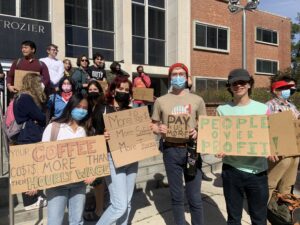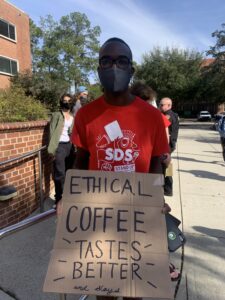
Behind the counters of Florida State University’s food services like Starbucks, Chick-fil-A and Steak ’n Shake, student workers are organizing to increase their wages and demand safer working conditions.
On Jan. 19, Instagram account @fsuagainstaramark created their first post, detailing the history of worker exploitation, shameful food practices and prison funding present at Aramark. The multinational corporation has come under fire multiple times for its use of incarcerated people to pack and prepare food while being unpaid. Their unwanted presence on FSU’s campus is nothing recent, but in response to Starbucks’ recent announcement to increase its minimum wage to $15 an hour, Aramark has not made any plans to increase employees’ wages beyond the current $10.50 amount.
Along with zero hazard pay throughout the pandemic, company-wide benefits and two weeks of formal training, the account proceeded to announce a three-day boycott that would conclude with a march from Strozier Library to Dirac Library on Feb. 2. Between their comment sections and statements shared by anonymous employees, students shared the same sentiment that the training, wages, lack of company benefits and turnover rate of staff are unfair to the employees.
“In solidarity with FSU’s baristas we are organizing a boycott to demand Aramark deliver labor standards to on-campus Starbucks baristas that resemble corporate Starbucks, this includes: $15 minimum wage, sick pay for COVID, the providing of quality KN95 masks, and two weeks formal training,” the post wrote in their Instagram caption.

With organizations like FSU Dems and Students for a Democratic Society (SDS) present, the support for Aramark employees was attracted a crowd of approximately 80 people who gathered outside of Strozier Library on Wednesday. Signs that read “your coffee costs more than their hourly wage” or “ethical coffee tastes better” were present among the protesters as FSU Dems, SDS and the organizers spoke.
Marci Lafoso, one of the two organizers who spearheaded the movement, welcomed attendees to the protest by giving a speech.
“Solidarity is a very important thing,” Lafoso said. “It empowers workers and lets them know they can advocate for themselves either through unionizing or whatever direct action they want to do, and they will have the back of the student body at FSU.”
They proceeded to begin chanting, “Stand up, fight back,” one of the many chants that rang throughout the crowd.
Evan Livingston, the co-organizer with Lafoso, shared that higher wages provide lower-income students with the opportunity to “earn money for themselves to be able to live comfortably and not have to fear about where their food comes from or how they’re going to pay their tuition next semester.”
Jacob Muldoon, who serves as the vice president of SDS, encourages students to get involved with organizations like SDS that seek to “build a class consciousness” among students.
“We want to really get people involved in political life outside of the electoral process or getting involved in direct action, and also in union activity and just labor in the labor movement in general,” he said. “We think that it’s a really important step for students who will be in the labor force in a couple of years to really have an understanding of their place as workers and to kind of build a class consciousness among our students to prepare for a progressive future.”
After the demonstrators arrived at the Dirac Library, Lafoso concluded the protest by quoting activist and revolutionary Assata Shakur.
“It is our duty to fight for our freedom. It is our duty to win. We must love each other and support each other. We have nothing to lose but our chains.”